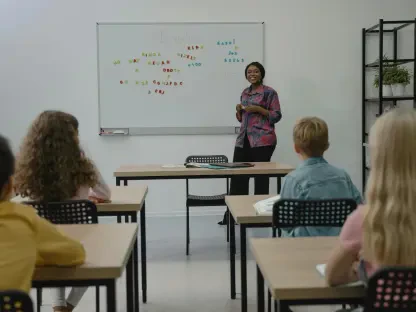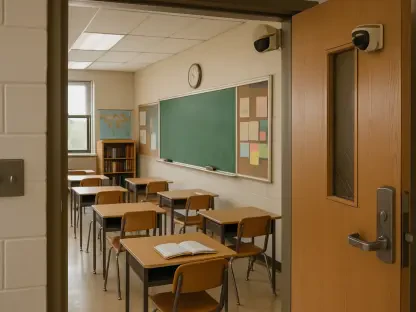What if the secret to unlocking a thriving classroom lies not in stricter rules or more tests, but in teaching students how to navigate emotions, conflicts, and relationships with the same dedication given to algebra or history? Imagine a middle school teacher standing before a class, voice strained from redirecting outbursts, papers scattered after yet another disruption—a scene far too common in schools across the nation, reflecting a deeper crisis where behavior challenges overshadow learning and drain educators’ resolve. The urgency to address this issue has never been clearer, as classrooms struggle to adapt to a generation shaped by unprecedented social and emotional pressures.
Why Are Classrooms in Crisis?
The reality of today’s educational environment reveals a stark challenge: behavioral disruptions have become a barrier to effective learning. Teachers report spending significant portions of their day managing conflicts, outbursts, and disengagement, often at the expense of lesson plans. A recent survey found that 78 percent of educators have considered leaving the profession due to stress from student behavior, a statistic that underscores the depth of this struggle. Schools, designed to foster growth, are instead becoming battlegrounds where emotional and social needs go unmet.
Beyond the classroom walls, the roots of these issues stretch into broader societal shifts. The lingering effects of global disruptions, such as the pandemic, have left many students grappling with anxiety and disconnection, while the constant pull of social media erodes face-to-face interaction skills. These external forces collide with internal pressures, creating an environment where neither students nor teachers feel equipped to cope. The result is a cycle of frustration that demands a fundamental rethink of how behavior is addressed in education.
The Overlooked Gap: Behavior’s Impact on Education
Behavior isn’t merely a distraction; it’s a foundational element of learning that has been sidelined for too long. When students lack the skills to regulate emotions or resolve disputes, academic progress suffers, and classroom dynamics unravel. This gap affects not just individual achievement but the entire school ecosystem, from teacher morale to family involvement. Unaddressed, it perpetuates a system where potential is stifled by preventable challenges.
Data paints a sobering picture of the consequences. Studies indicate that schools with high rates of behavioral incidents see lower test scores and higher dropout rates, signaling a direct link between conduct and outcomes. Moreover, the strain on educators is palpable—burnout rates are climbing as they navigate these issues without adequate support. This hidden crisis calls for a shift in perspective, recognizing behavior as a critical area of focus rather than an afterthought in educational policy.
Redefining Behavior: A Skill to Be Taught
The notion that students inherently know how to behave is a myth that must be dismantled. Just as reading and math require structured instruction, so too do social and emotional competencies. Modern challenges, from digital overload to post-pandemic stress, have made this need more pressing than ever. Schools must move beyond punitive measures and embrace behavior as a teachable skill, integrated into the daily fabric of learning.
Evidence of this approach’s potential is striking. In Newton County Schools, Georgia, a program focusing on behavior training and mentorship for educators led to a 24 percent drop in disciplinary infractions within a single semester. Similarly, Clark County School District in Nevada saw an 11 percent reduction in suspensions after implementing real-time coaching for teachers. These examples highlight a powerful truth: when behavior is treated as a core subject, with intentional strategies and support, transformative change follows.
Champions of Change: Stories and Evidence
Voices from the field reinforce the urgency and promise of prioritizing behavior education. Dr. Tami Dean, a leading researcher in educational psychology, argues that “behavior is the unspoken curriculum that shapes every interaction in a school—if it’s not taught, it’s learned through chaos.” Her perspective, shared with co-author Kareeme Hawkins, emphasizes that structured behavior education can rebuild trust and engagement in classrooms. Their insights resonate with a growing movement to rethink traditional discipline.
Teachers on the front lines offer compelling testimony as well. In Newton County, one educator noted how collaborative coaching sessions reshaped their approach, turning a once-hostile classroom into a space of mutual respect. “It wasn’t about control; it was about connection,” they shared. Such stories, paired with data showing rapid improvements in school climate through mentorship programs, build a strong case for systemic investment in behavior-focused strategies. The evidence is clear: this shift isn’t just possible—it’s already working.
Building the Future: A Blueprint for Schools
Transforming how schools address behavior requires a clear, actionable plan that unites all stakeholders. Embedding social-emotional learning into daily curricula stands as a starting point, ensuring students practice skills like empathy and conflict resolution alongside academic lessons. Teacher training must also evolve, offering consistent, hands-on support through models like Clark County’s “shoulder coaching,” where mentors provide real-time guidance during challenging moments.
A broader vision involves adopting a whole-child, whole-school, whole-family framework. This approach recognizes that behavior education extends beyond the classroom, requiring partnerships with parents and community resources to create a supportive network. Data-driven tools can track progress, allowing districts to adjust strategies based on measurable outcomes. By implementing these steps, schools can cultivate environments where behavior becomes a cornerstone of success, empowering students and educators alike to thrive.
Reflecting on the Path Forward
Looking back, the journey to reframe behavior as a core element of education revealed a profound truth: the challenges in classrooms were not isolated incidents but symptoms of a system overdue for change. The stories of struggle from teachers, the data highlighting the toll on learning, and the successes in districts like Newton County and Clark County painted a vivid picture of both the problem and the solution. It became evident that ignoring behavior was no longer an option.
The next steps rested on bold action—school leaders had to commit to integrating social-emotional learning as a priority, not an add-on. Policymakers needed to allocate resources for teacher training and mentorship, ensuring no educator faced these challenges alone. Families, too, had a role in reinforcing these skills at home. Above all, the collective resolve to treat behavior with the seriousness of any academic subject promised a future where schools were not just places of instruction, but sanctuaries of growth and connection.









